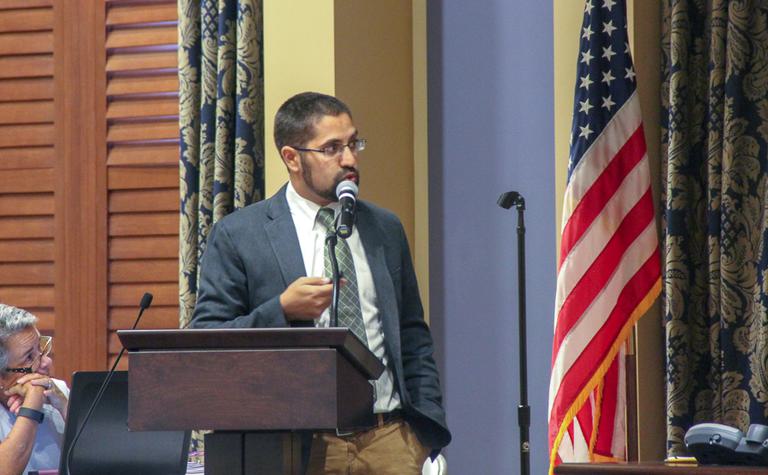
Education
Oklahoma schools find creative ways to expand learning
Staci Elder Hensley | October 15, 2018
Officials from a range of traditional public schools, public charter schools, and private schools briefed state lawmakers on some of their innovative educational approaches during an interim study on Sept. 11 in the Senate Education Committee. The study was held at the request of state Sen. Rob Standridge (R-Norman).
Cecilia Robinson-Woods, superintendent of the Millwood School District in Oklahoma City, said she took advantage of a little-known state law and switched her district’s elementary and middle schools to charter conversion schools. After partnering with Teach for America and implementing a “Success for All” reading program, school officials have seen a dramatic upsurge in progress from its inner-city students, she told the committee.
In Norman, a new public charter school, Le Monde International School, opened its doors last month with 132 students. At the full-immersion language school, students are taught in Spanish or French 90 percent of the time, “except for classes where English is required for the subject matter,” said executive director Lance Seeright. “All students have an education plan based on their learning style. Since we have just opened, and not everyone is familiar with the concept of immersion learning, we are working on earning trust from the community. It’s up to us to prove our worth.”
Epic Charter Schools operates a virtual learning curriculum accessible to pre-K through 12th grade students across the state. Many Epic students were victims of severe bullying or in an otherwise unsafe and ineffective environment prior to making the switch to Epic, said David Chaney, superintendent and co-founder. “In some rural areas, we’re the only charter school option,” he said. “What it highlights for me is the need for different alternatives.”
Collegiate Hall is a college-preparatory charter school in Tulsa for students in grades four through eight. Students are flourishing academically in a school culture that strongly emphasizes a team approach and extensive teacher training, lead founder Nikhil Kawlra told the committee.
Bartlesville Public Schools, meanwhile, established a successful partnership with the national nonprofit Project Lead the Way (PLTW), the Bartlesville Public Schools Foundation, and ConocoPhillips to provide a cutting-edge program in science, technology, engineering, and math (STEM) education. Slightly more than 2,000 students at the high school and middle schools are learning in state-of-the-art laboratories and on free Chromebook laptops. All three of the schools are officially designated as PTLW Gateway Distinguished Schools. The programs help students develop skills, expose them to STEM careers, and give them a significant advantage as they move toward college and future careers, said Superintendent Chuck McCauley.
“We have families who move to Bartlesville to send their kids to this school.” —Clair Bartley, Paths to Independence (PTI) co-founder and director
Focusing on the Future
Another success story in Bartlesville is Paths to Independence (PTI), a nonprofit private school for students with autism. Opened in 2010, the school serves students ranging in age from three through adult. “We serve the whole spectrum of autism disorders, which is very unique,” said co-founder and director Clair Bartley, who’s also a special education teacher. “We have families who move to Bartlesville to send their kids to this school.”
Bartley said she conceived the idea for PTI because she saw large numbers of autistic children falling through the cracks in public schools. Many were severely bullied. They’re also suspended at much higher rates than other students, often because regular teachers don’t understand how to handle their behavior.
“What we do at Paths to Independence is to focus on the future,” Bartley said. “The number-one reason parents opt out of public schools is the lack of personal attention. We have a two-to-one student-teacher ratio, and each student works from an individual education plan. We also teach parents how to be an effective advocate for their child and for autistic children in general.”
In addition to regular classroom subjects, the students learn basic daily living, technological, and social skills. The school’s growth has accelerated rapidly thanks to the Lindsey Nicole Henry Scholarship Program for Children with Disabilities, a private-school voucher program enacted in 2010.
“See a need and fill it” may be a business mantra, but it’s also a key factor behind several private and charter schools around the state, presenters said. Many of these schools have opened their doors only within the past year or two and, like Paths to Independence, are geared toward a highly specific student population.
Crossover Preparatory Academy is an all-male school in north Tulsa with a focus on college preparation for its mostly African-American students, in 7th through 12th grades. Executive director Philip Abode said the curriculum is modeled after a successful program in New Jersey. The push to create the school, he said, came after realizing that only 22 African-American senior boys in 2015 were college-ready in Tulsa Public Schools.
Crossover Prep relies heavily on Oklahoma’s private-school tax-credit scholarship program enacted in 2011.
“The tax credit allows us to have these students’ tuition free,” Abode said. “We don’t believe access to a good education should be limited.” Plans are now in the works to create a similar academy for young African-American women, he said.
Staci Elder Hensley
Independent Journalist
Former newspaper reporter Staci Elder Hensley is a freelance writer, editor, and columnist. A graduate of the University of Oklahoma, she is a former news coordinator for both the Oklahoma Tourism and Recreation Department and the University of Oklahoma Health Sciences Center. She served as a regular columnist for The Daily Oklahoman and Distinctly Oklahoma magazine, and her credits also include articles produced for multiple state and national publications, including The Journal Record, The New York Times, The Dallas Morning News, and others.